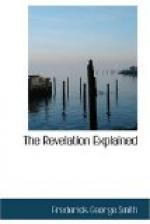21. And the twelve gates
were twelve pearls; every several gate
was of one pearl: and
the street of the city was pure gold, as
it were transparent glass.
22. And I saw no temple
therein: for the Lord God Almighty and
the Lamb are the temple of
it.
23. And the city had
no need of the sun, neither of the moon, to
shine in it: for the
glory of God did lighten it, and the Lamb
is the light thereof.
24. And the nations of
them which are saved shall walk in the
light of it: and the
kings of the earth do bring their glory and
honor into it.
25. And the gates of
it shall not be shut at all by day: for
there shall be no night there.
26. And they shall bring
the glory and honor of the nations into
it.
27. And there shall in
no wise enter into it any thing that
defileth, neither whatsoever
worketh abomination, or maketh a
lie: but they which are
written in the Lamb’s book of life.
We have here a magnificent description of the New Jerusalem, representing the home of the redeemed. The various symbols employed in its description must of course he understood as symbolical. We have no means of knowing just what our future home will be like; but that it will be a place of wondrous beauty and transcendent glory is shown by the fact that everything which is considered grand and glorious in this world is here chosen to represent the home of the redeemed. The symbols selected to describe it are objects of such priceless worth, even exceeding royal splendor, that we pause in astonishment and exclaim, “What must the reality be?” The conditions upon which entrance to this city may be obtained (ver. 27; chap. 22:14) show clearly that our future and eternal home is the chief burden of this vision and not merely our spiritual inheritance in this world.
“In approaching Jerusalem, the traveller is not aware of its proximity, until, ascending an eminence, the glorious city bursts upon his astonished vision, when he is ready to exclaim with the Psalmist—’Beautiful for situation, the joy of the whole earth is Mount Zion, on the sides of the north, the city of the great king.’” Psa. 48:2. John was carried to “a great and high mountain,” from which commanding point of view he was enabled to survey in all its boundless extent the surpassing glories of the New Jerusalem. Never did imagination conceive anything approaching the sublimity and grandeur of the scene here described by the pen of inspiration. It was “a great city”—how great we shall soon discover—the holy Jerusalem, descending out of heaven from God.




